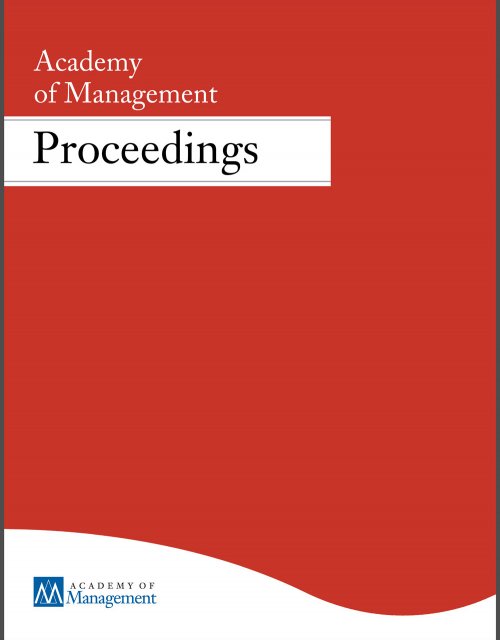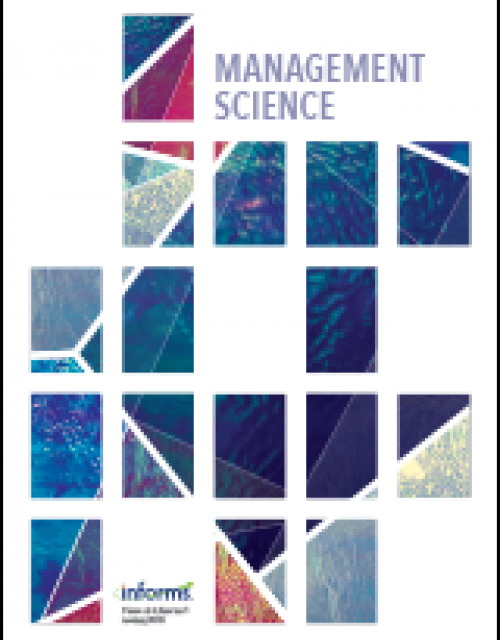Publication records
Subject(s)
Technology, R&D management
Keyword(s)
research questions, experiential knowledge, crowd science
Recently, organizations started exploring the use of crowdsourcing not only to solve pre-defined problems, but also to identify novel problems worth solving – not least in the hopes of more effectively aligning research and innovation agendas with issues of societal relevance. Yet, a key challenge is that many crowd-identified problem statements are not novel and simply re-state well-known problems, resulting in an ineffective way to organize problem identification. In this study, we theorize that the extent of “user knowledge” among crowd members, which can be acquired both through one's own experience as someone affected by a particular situation (e.g., as a patient) and through engagement with the experiences of others (e.g., as a caretaker or medical professional), increases the novelty of problem statements. In addition, we explore whether the novelty of crowd-identified problem statements might be improved by providing crowd members with two types of complementary knowledge related to the problem space: declarative and procedural. Our preliminary results from a large-scale online experiment show a significant positive relationship between “user knowledge” of crowd members and the novelty of the problem statements they submit. Providing crowd members with complementary knowledge related to the problem space does not lead to significant novelty improvements, according to our preliminary analysis. Nevertheless, these initial findings indicate that the impact of experiential knowledge in problem-solving also applies to problem finding. This has significant implications for organizations aiming to effectively utilize crowdsourcing for establishing their research and innovation agendas.
With permission of the Academy of Management
Volume
2024
ISSN (Online)
2151-6561
ISSN (Print)
0065-0668
Subject(s)
Technology, R&D management
Keyword(s)
augmentation, automation, task routinization, human capital, crowd science
In this symposium, we will examine a wide array of questions and hypotheses that focus on the people who conduct science -- as a complement to more established research traditions that focus on the publications and patents that people produce. Talks will cover topics that relate to a variety of career stages and background characteristics such as: What are the characteristics of scientists who are also inventors? How is Artificial Intelligence being integrated into crowd science projects? How does media coverage about research variably impact the authors of the research? Talks will also feature innovative data resources including one presentation that is able to examine the ways in which External Letters variably influence academic careers with respect to tenure and promotion decisions (particularly in relation to faculty who seek and gain one or more patents).
With permission of the Academy of Management
Volume
2024
ISSN (Online)
2151-6561
ISSN (Print)
0065-0668
Subject(s)
Diversity and inclusion; Human resources management/organizational behavior
Keyword(s)
Diversity, equity and inclusion, DEI, global workforce, pandemic, employee well-being, corporate value, women
The pandemic has not wholly derailed DEI as much as feared. The insights from the DEI officers of globally active companies demonstrate optimism and inspiration for those designing DEI strategies in 2022.
ISSN (Print)
0015-6914
Subject(s)
Marketing
Keyword(s)
Luxury, digital, innovation, branding
Traditional luxury goods companies have treated digital as a channel. But they’re now starting to treat it as a marketplace in its own right, thanks largely to Blockchain technology, which has delivered the Non-Fungible Token. Today, the key ingredients of luxury – rarity, exclusivity, and cost — can also apply to virtual products, as companies like Balenciaga, Louis Vuitton, and Gucci have realized.
ISSN (Print)
0017-8012
Subject(s)
Entrepreneurship; Human resources management/organizational behavior; Technology, R&D management
Keyword(s)
startup early employees, technology entrepreneurship, human capital, job choice, scientists and engineers
Early-stage technology startups rely critically on talented scientists and engineers to commercialize new technologies. And yet, they compete with large technology firms to hire the best workers. Theories of ability sorting predict that high ability workers will choose jobs in established firms that offer greater complementary assets and higher pay, leaving low ability workers to take lower-paying and riskier jobs in startups. We propose an alternative view in which heterogeneity in both worker ability and preferences enable startups to hire talented workers who have a taste for a startup environment, even at lower pay. Using a longitudinal survey that follows 2,394 science and engineering PhDs from graduate school into industrial employment, we overcome common empirical challenges by observing ability and stated preferences prior to first-time employment. We find that both ability and career preferences strongly predict startup employment, with high ability workers who prefer startup employment being the most likely to work in a startup. We show that this is due in part to the dual selection effects of worker preferences resulting in a large pool of startup job applicants, and startups “cherry picking” the most talented workers to make job offers to. Additional analyses confirm that startup employees earn approximately 17% lower pay. This gap is greatest for high ability workers and persists over workers’ early careers, suggesting that they accept a negative compensating differential in exchange for the non-pecuniary benefits of startup employment. This is further supported by data on job attributes and stated reasons for job choice.
© 2022, INFORMS
Volume
70
Journal Pages
3381–4165
ISSN (Online)
1526-5501
ISSN (Print)
0025–1909
Subject(s)
Diversity and inclusion; Ethics and social responsibility
Keyword(s)
Course design and delivery, Women in higher education, Feature article, Europe
JEL Code(s)
124
Subject(s)
Human resources management/organizational behavior; Information technology and systems; Strategy and general management; Technology, R&D management
Keyword(s)
artificial intelligence, algorithmic management, management, crowd science, citizen science, organization of science
Volume
53
Journal Pages
104985
Subject(s)
Economics, politics and business environment; Information technology and systems; Technology, R&D management
Keyword(s)
fiber optic technology, state aid, ex-post evaluation, efficiency, OECD countries
JEL Code(s)
C51, C54, H25, L52, O38
Volume
33
Journal Pages
672–700
Subject(s)
Human resources management/organizational behavior
Keyword(s)
network ecology; networking styles; academic collaboration; multiplex networks; sociology of knowledge
Volume
77
Journal Pages
166–179
ISSN (Online)
1879-2111
ISSN (Print)
0378-8733
Subject(s)
Economics, politics and business environment
Keyword(s)
strategic decisions, M&A China-Europe, hidden champions, industrial markets, entering markets abroad, managing premium products and no-frills products in one corporation
In 2013, Trumpf, a global market leader machine tools from Germany, acquired the majority shares in JFY, a smaller machine tool manufacturer from China. With this acquisition, Trumpf wanted to enter the fast-growing low-cost segment of the market. Until then, JFY had performed very well on the Chinese market, but the company's success increasingly waned after the acquistion. Other Chinese competitors performed significantly better. After JFY even had to report losses for the first time in 2019, Trumpf changed the management at JFY. Under the new management, initial successes were achieved, but even two and a half years later, JFY still did not reach the profit targets which all business units at Trumpf had to meet. In a Trumpf management meeting in October 2022, a decision was therefore to be made as to whether JFY should remain part of Trumpf or be sold off again.
| buy now | buy now | buy now |

